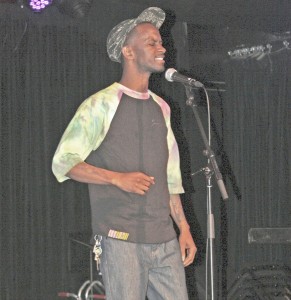Ground Zero holds Open Mic night
On Tuesday evening, USC students and faculty gathered at Ground Zero Performance Café for an Open Mic Night focused on race, culture and identity. The event was an installment of Project ReMix, an interactive discussion series coordinated by Asian Pacific American Student Services, the Center for Black Cultural and Student Affairs and El Centro Chicano.

Rhyme time · Judah 1, a slampoet from Pomona, performed a piece about black identity at Ground Zero on Tuesday evening. – Maral Tavitian | Daily Trojan
Launched in 2008, Project ReMix teaches multiracial students about how their identities are linked to social justice issues. The program engages participants in a dynamic format, with past events including movie screenings, writing workshops and community discussions.
The Open Mic Night featured spoken word poetry and music by USC students and three local artists: David Romero, Marjorie Light and Judah 1.
Romero, a Chicano poet and alumnus of USC, described a lifelong struggle to define his identity as a Mexican born in the United States. He opened the show with a poem about cheese enchiladas.
“I want a chance to make you all my cheese enchiladas,” Romero said. “And with every bite, with every delectable morsel, I want you to remember that you love Mexicans, that you love Latinos. Or I’ll keep making these cheese enchiladas for you, until you do.”
Azmera Hammouri-Davis, a sophomore majoring in social sciences, recited “Freedom,” a piece she wrote in light of Black History Month.
“Freedom sounds like the voices of the oppressed, finally getting a mic and laying it all to rest,” Davis said. “Freedom looks like justice, sufficient justification for historical abuse of marginalized groups who were born into this society created to keep them down.”
Following Davis, Light performed a manifesto piece entitled “Decolonize Your Mind.” A self-described “Renaissance woman” and “one-woman art festival,” Light is a Filipina musician, writer and DJ from Eagle Rock, Calif.
To create the track for “Decolonize Your Mind,” she mixed Filipino gongs over hip-hop beats.
“I like to take parts of my culture and make them relevant to my life here in the States. That’s what remixing is all about,” Light said.
In her second rap called “Bad A–,” Light embraced her ethnic roots and discussed female empowerment.
“I can sing, rap and dance so naturally. Don’t be mad at me because I got talent and beauty. I create my own empire, run my own show,” Light said.
She continued with confidence, stating, “Yeah I’m kind of a bada–, queen of the neighborhood … Is it any wonder, you really surprised, that a girl like me would step up tonight?”
Judah 1, a slam poet, author and teacher from Pomona, covered a wide range of topics relating to black culture and identity.
“My people perish for a lack of knowledge, under educated on purpose. Now ignorance spreads corruption, now n—-rs they call themselves, truly they have forgotten themselves,” he said.
Romero, Light and Judah 1 each brought a distinct flare to the show, and embracing ethnicity and cultural traditions were consistent themes throughout their performances.
To conclude the evening, audience members stepped up to the stage for an open mic session.
Hassan Romieh, a freshman majoring in business administration, performed for the first time in front of an audience. He took advantage of the opportunity to break out of his comfort zone.
“I usually don’t do stuff like this,” Romieh said, “I’m a spring admit, so I’m trying to turn a new leaf. I’m really glad I did it. Otherwise I would’ve regretted it.”
Miranda Freeman, an undeclared freshman, valued the broad span of topics covered.
“I really enjoyed the performances,” Freeman said, “I liked that there was a variety of poems about love, war, cultural diversity and race. Everyone brought their own style.”
Jennifer Sunmonu, a visiting student from Duke University, appreciated the inclusive nature of the show.
“The poems hit on all the social issues. They weren’t geared just toward blacks or Hispanics, which I thought was great,” Sunmonu said.
Project ReMix has several events on its spring semester calendar.
In February, the program will host a screening of An Ordinary Hero: The True Story of Joan Mulholland and a Q&A session with the star of the film. In March, Asian Pacific American Student Services, the Center for Black Cultural and Student Affairs and El Centro Chicano will lead a community forum focused on the future of higher education for minorities.
As with all of Project ReMix’s events, the lecture will provide a stimulating environment for students to learn about social issues.
